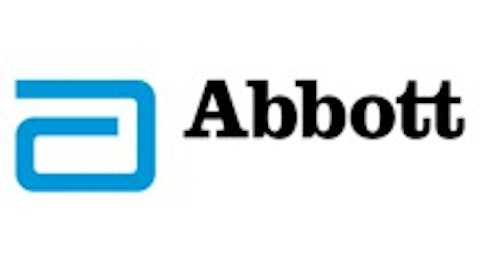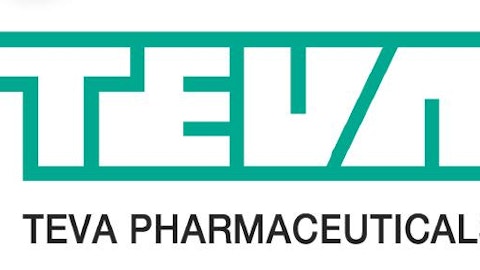Currently, a majority of pharma companies are facing the issue of generic competition. This has forced them to either expand their footprints in different geographical locations or prepare a better product pipeline. This will help these companies maintain their revenue streams once their patents on current top drugs expire.
In this article, I have picked three such companies: Abbott Laboratories (NYSE:ABT), Celgene Corporation (NASDAQ:CELG), and Teva Pharmaceutical Industries Ltd (ADR) (NYSE:TEVA). All three announced strong first-quarter 2013 results. Let’s see how these companies are planning to face the generic threat.
Emerging markets to drive earnings
Abbott Laboratories (NYSE:ABT) reported first-quarter revenue of $5.38 billion with growth of 1.8% year over year. It was mainly driven by emerging markets, contributing 40% of total sales. Its nutrition and diagnostics segments were the revenue drivers in emerging markets. Abbott’s diagnostics segment grew 6.4% year over year. The profit margin continued to improve for this segment and management expects operational growth of 10% because of its core lab sales, which grew 9% year over year.

Talking about Abbott Laboratories (NYSE:ABT)’s sales in the nutrition segment, it posted stronger sales of $1.7 billion in the first quarter of 2013, up 9% year over year. Out of total nutrition sales, 14% was contributed by international sales, and 45% was accounted from growth in the emerging markets. This growth was mainly driven by increased demand in pediatric and adult sales, which led to year over year increase in sales of 13% and 4%, respectively.
With new product launches in this segment under infant brands such as Similac formula, PediaSure, and a new line of Kidz ZonePerfect bars, the nutrition segment is expected to witness growth in emerging markets. New product launches over a five year period should contribute another $1 billion in sales to the nutrition segment by 2016. Seeing significant growth in this nutrition segment, management expects it to deliver 20% of the operating margin by 2015.
Potential new drug indications
Celgene Corporation (NASDAQ:CELG) announced first-quarter 2013 results with sales of $1.46 billion, an increase of 15% year over year. Its revenue was driven by strong performance of its product Revlimid, which treats multiple myeloma. Revlimid sales were around $1 billion, an increase of 16% year over year. In June 2013, the FDA will announce its decision for Revlimid as an additional treatment of relapsed and refractory mantle cell lymphoma, which will provide it with additional addressable market.
For this year, Celgene Corporation (NASDAQ:CELG)’s key focus is to gain EU label expansion of this product for newly diagnosed myeloma patients below the age of 75 and progression-free survival. With its diversified treatment portfolio, Revlimid will be a key driver for the company’s long-term growth.
In February, the FDA approved Pomalyst for advanced multiple myeloma. Pomalyst reported impressive initial sales of $29 million, above analysts’ expectations of $8 million. Out of total sales, $22 million was from the U.S. and the remaining $7 million was from early access programs in Europe. With so much growth in a short span of time, sales are expected to reach $117 million by the end of 2013. This year, we can expect Pomalyst’s new indications for myelofibrosis and systemic scleroderma too. Analysts expect Pomalyst to be a future blockbuster drug for Celgene Corporation (NASDAQ:CELG), estimating $1 billion-$1.5 billion in sales by 2017, targeting the multiple myeloma market of $6.5 billion.
Fighting generic competition
Teva Pharmaceutical Industries Ltd (ADR) (NYSE:TEVA) has faced a major setback from generic drug maker Actavis Inc (NYSE:ACT), which has won U.S. court approval for its Pulmicort generics. Pulmicort was AstraZeneca’s product, and one of the best branded drugs, contributing $1 billion in sales until 2008, when Teva launched the generic version of Pulmicort. Generic Pulmicort is one of the largest generic medicines of the company, which contributed $525 million in sales in 2012.
Presently, Teva is the only generic drug maker for Pulmicort in the market, but with the launch of Actavis’ generic, Teva will face new competition in 2013. Actavis plans to launch its generic version by the second quarter of 2013. With new generic competition, analysts see a decline in Teva’s generic gross margin in the second quarter.
Teva Pharmaceutical Industries Ltd (ADR) (NYSE:TEVA)’s patent for its branded drug Nuvigil, which treats sleep disorders, will expire in December 2023. The company has already settled claims with Mylan, and according to the settlement, Mylan will be able to sell its generic version of Nuvigil until June 2016. The U.S. court has ruled one positive decision in favor of Teva, so that it will enjoy Nuvigil sales without facing any generic competition, other than Mylan’s generic version, until 2023.
Hence, patent protection will provide it a long-term opportunity to grow for almost the next ten years. Nuvigil sales in the first quarter were reported at $83 million, and its long-term patent protection will help the company attain long-term gains, which will counter against the losses incurred by Actavis Inc (NYSE:ACT)’ Pulmicort generic.
Now is the time to buy
Abbott Laboratories (NYSE:ABT)’s nutrition and diagnostic segments, supported by emerging market growth, have performed very well and are expected to enhance its earnings in the long-term.
Celgene Corporation (NASDAQ:CELG)’s earnings are expected to get boost with its new drug Pomalyst, which has outperformed consensus estimates of $8 million, indicating positive outlook for 2013. It is expected to be a blockbuster drug for the company.
For Teva, with Nuvigil’s patent protection, I can see long-term gains; its growing sales are expected to offset losses incurred by Pulmicort generics.
I am optimistic on these pharmaceutical companies and recommend buying these stocks.
The article 3 Pharma Companies to Buy in 2013 originally appeared on Fool.com and is written by Shweta Dubey.
Copyright © 1995 – 2013 The Motley Fool, LLC. All rights reserved. The Motley Fool has a disclosure policy.



